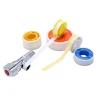As the demand for extreme working conditions materials in various industries continues to grow, polytetrafluoroethylene (PTFE), as a representative material of fluorinated thermoplastics, is playing an irreplaceable role in engineering, medical, automotive, electronics and chemical industries with its excellent physical and chemical stability. For material suppliers and supporting parts manufacturers, the diverse application scenarios of PTFE not only represent technical challenges, but also mean stable and continuously expanding market opportunities.
1. Engineering manufacturing field: the "nemesis" of friction, corrosion and high temperature
PTFE is almost the first choice in engineering applications that require self-lubrication, non-stick, wear resistance and chemical corrosion resistance. Its ultra-low friction coefficient and excellent thermal stability make it widely used in the manufacture of key moving parts such as bearings, valve seats, pump body accessories, plugs, gaskets, etc., especially for mechanical systems under high pressure, high speed and dry friction environments. For equipment manufacturers, the use of PTFE can effectively extend the life of parts, reduce maintenance frequency, and improve the reliability of the whole machine.
2. Medical industry: an excellent choice for bio-inert materials
PTFE has excellent biocompatibility and chemical inertness, and can exist stably in the human body for a long time without triggering an immune response. This feature makes it widely used in medical devices such as heart patches, artificial blood vessels, and ligament substitutes. For medical material suppliers, developing high-purity, pyrolysis-free medical-grade PTFE not only raises the technical threshold, but also helps customers win a larger share in the high value-added market.
3. Chemical and pharmaceutical industries: core raw materials for corrosion protection
Chemical equipment operating in highly corrosive environments such as strong acids, strong alkalis, chlorine, and solvents has extremely high requirements for sealing and corrosion resistance. PTFE is widely used in the manufacture of pumps, impellers, heat exchangers, pressure vessels, reactors, and their linings or spray coatings due to its inertness to almost all chemicals. Its high-purity version is also suitable for pharmaceutical and food grade requirements. For anti-corrosion equipment manufacturers and coating processors, the processing adaptability and anti-corrosion grade selection of PTFE materials are the key to achieving differentiated delivery.
4. Automotive industry: Coping with challenges of high pressure, high heat and fuel system
Modern automotive systems are becoming increasingly complex, and key parts such as seals, gaskets, and transmission systems face harsh environments such as high temperature, high pressure, chemical contact, and continuous dynamic operation. PTFE's fuel resistance, wear resistance, self-lubrication, and sealing properties make it an ideal material for valve stem seals, O-rings, power steering systems, transmission components, fuel hose linings, and other components. Especially in new energy vehicles and hybrid systems, PTFE solutions are expected to gradually replace traditional rubber seals and become a key material support for system reliability.
5. Electronic and electrical fields: Stable insulation and microstructure molding
In high-frequency communication equipment, aerospace electronic components, and electrical insulation systems, PTFE has excellent dielectric properties and arc resistance, and can maintain electrical stability at high temperatures. Its common applications include insulation layers of flexible circuit boards, high-voltage cable coatings, and electrical connector gaskets. At the same time, PTFE's low dielectric constant and thermal stability give it greater advantages in high-frequency electronic devices such as 5G and radar communications.
Supply Chain Revelation: Value Extension for Customers in Multiple Industries
For raw material suppliers, composite material developers and high-performance component manufacturers, polytetrafluoroethylene is not only a single material, but also a carrier leading to high value-added multi-industry solutions. By developing customized formulas (such as filler-reinforced PTFE), optimizing processing technology (such as isostatic pressing, CNC precision turning), and expanding certification systems (such as USP Class VI, FDA, RoHS, ASTM standards), PTFE product applications can be upgraded from general engineering plastics to strategic high-performance materials.










